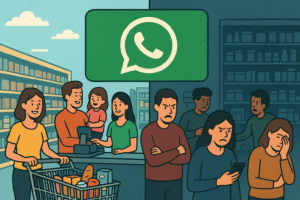WhatsApp’s Double Life: The Universal Supermarket We Love and Loathe
WhatsApp leads a double life, serving as both an intimate space for friends and family and a chaotic public utility for everything from banking to work. This is especially true in countries like India, where its mobile-first, frictionless design made it a universal “supermarket” for digital life. For businesses, it’s a dream channel for customer engagement but a risky venture due to its reliance on Meta’s changing policies. The platform’s convergence of personal and professional spheres creates a constant, often frustrating, context switch for users.
Now, a new wave of startups is building AI tools to manage this chaos, aiming to make WhatsApp smarter for users and businesses alike. Their work is part of a larger battle among tech giants to become the primary “point of entry” for the AI-driven future. Ultimately, Meta aims to transform WhatsApp into the central place where users command an AI assistant to manage their entire digital life. This dual identity makes WhatsApp indispensable, deeply annoying, and one of the most valuable platforms in the world.

WhatsApp’s Double Life: The Universal Supermarket We Love and Loathe
For over two billion users, especially in India, WhatsApp is no longer just an app. It’s a digital reflection of our lives—a chaotic, indispensable, and often maddening town square. We cherish its intimate groups for family and friends, yet we’re endlessly annoyed by the bombardment of forwarded messages, work updates, and merchant promotions.
This is the core of WhatsApp’s double life. It’s our most personal space and our most public utility, all squeezed into one green icon. For businesses, this duality is even more pronounced: it’s the dream channel for reaching customers at an unprecedented scale, yet a risky platform entirely controlled by Meta’s shifting policies and APIs.
How did we get here? And is there a way to resolve this tension?
The Great Indian Supermarket
To understand WhatsApp’s dominance, think of it not as a tool, but as a supermarket. As Dharmesh Ba, founder of October Chat, astutely observes, “WhatsApp feels like Dmart. You can get everything from one place.”
This is the secret to its success. In a single aisle, you can:
- Socialize: Catch up with friends in a cricket group or watch videos sent by relatives.
- Conduct Business: Manage customer queries, vendor orders, and even payroll through a dozen different work groups.
- Consume Entertainment: For many, the nightly ritual isn’t Netflix, but scrolling through the videos shared on WhatsApp Status.
- Manage Life: Receive bank OTPs, track orders, and pay bills.
Indians, it seems, have a unique appetite for this kind of organized chaos. The app’s universal accessibility—it’s mobile-first, free, and works seamlessly on any device with just a phone number—erased the friction that plagued other platforms. There are no friend requests or complex profiles. Your entire contact list is your social network by default.
The Business Paradox: Dream Channel or Gilded Cage?
For startups and established companies alike, this universality is a siren song. WhatsApp is a dream distribution channel for commerce, customer support, and payments, offering a direct line to customers who are already engaged and reachable.
However, this dream comes with a catch. Building a business on WhatsApp is like building a store inside someone else’s mall—a mall owned by Meta. Your success is tethered to their rules. Changes to their API, pricing models, or data policies can unravel a business model overnight. This reliance makes it a risky, albeit necessary, place to innovate.
The pandemic accelerated this convergence, blurring the lines further. WhatsApp abruptly transformed from a private haven into a professional workspace. It became the default tool for everything from daily stand-ups to project tracking, forcing users to navigate a constant context switch between family banter and urgent work deadlines.
Cracking the Code: The Quest for a Smarter WhatsApp
Can this double life be reconciled? A new wave of founders believes so, betting their startups on making WhatsApp a better, happier place for both besieged users and ambitious businesses.
The goal is to introduce intelligence and orchestration into the chaos. AI platforms like Periskope (founded by Swapnika Nag) aim to boost sales and support by helping businesses manage the overwhelming flow of messages efficiently. Meanwhile, tools like October Chat are building AI agents that can act on a user’s behalf within WhatsApp, automating tasks and filtering noise.
Their work points to a larger battle brewing in tech: the fight for the “point of entry.”
As Swapnika Nag explains, “If the future is agentic, and agents talk to each other… then the point of entry becomes very important.” Every major tech giant—from Microsoft with Copilot to Google with Gemini—is fighting to become the primary interface for your digital life, the place where you first speak to your AI assistant.
Meta’s ambition is clear: they want WhatsApp (and their Meta AI across all apps) to be that entry point. They envision a future where you tell your WhatsApp assistant, “Book my usual flight home for Diwali,” and it seamlessly converses with MakeMyTrip’s agent, your calendar, and your email to get it done, all within the chat you already use all day.
Whoever wins this battle will own an incredibly valuable gateway. For now, we remain both the beneficiaries and the subjects of this grand experiment, living out our digital double lives in the world’s most popular supermarket of messages.
You must be logged in to post a comment.